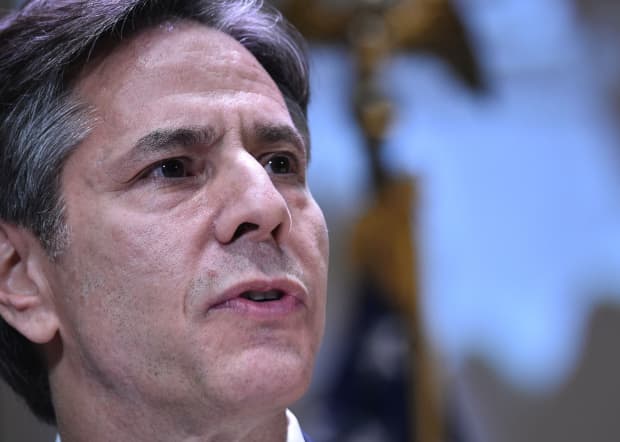This post was originally published on this site

Antony Blinken was nominated to be secretary of state Monday. If confirmed, he is seen leading the Biden administration’s reframing of U.S. relationships on the global stage after four years in which President Trump questioned longtime alliances. Faced with a similar task, Linda Thomas-Greenfield has been nominated to be ambassador to the United Nations.
AFP/Getty Images
At least two of the nominees for top spots in the Biden administration are likely to help shape the global warming fight as a core feature of his presidency. And neither has “climate” or “energy” in their job title.
The incoming president has nominated longtime adviser Antony Blinken to be secretary of state and Linda Thomas-Greenfield to be ambassador to the United Nations, both part of a handful of officials announced Monday.
Opinion: Biden chooses veteran diplomat Antony Blinken as secretary of state. Here’s why Europe should cheer
Their political histories and what’s expected to be a push by Biden to address climate change across departments and agencies rather than limit the issue to the Energy and Interior departments or the Environmental Protection Agency leave analysts expecting heightened roles on climate change for Blinken and Thomas-Greenfield, among others.
What’s more, Biden and his cabinet may look to stretch their executive powers on climate change in part due to the lack of might in Congress for Democrats, even if the party prevails with a Georgia Senate runoff. This scenario could limit major climate-change legislation such as the Green New Deal advanced by progressives, although both parties are working on respective bills that address renewable energy, carbon capture, carbon taxes and electric vehicles.
Don’t miss: From climate change to free-trading apps, brace for an aggressive SEC under Biden, experts say
As for Blinken, chief among his new tasks will be to re-establish the U.S. as a global ally in the voluntary Paris climate accord, the Iran nuclear deal and the World Health Organization — affiliations that were jettisoned by the Trump administration’s “America First” priorities. Blinken served as deputy secretary of state and deputy national security adviser during the Obama administration and has had close ties with Biden earlier in his career.
Read: 5 things to know about Antony Blinken, Biden’s nominee for secretary of state
The Paris pact aims to hold the increase in average global temperatures “well below” 2 degrees Celsius (3.6 degrees Fahrenheit), and ideally no more than 1.5C (2.7 F), compared to pre-industrial levels. Scientists argue that unchecked warming will be responsible for raising sea levels, stoking tropical storms and worsening droughts and floods. The only binding requirement of the voluntary pact is that nations have to accurately report on their efforts.
“These officials will start working immediately to rebuild our institutions, renew and reimagine American leadership to keep Americans safe at home and abroad, and address the defining challenges of our time — from infectious disease, to terrorism, nuclear proliferation, cyber threats and climate change,” the transition said in a statement.
“… [N]ot a single one of the big challenges we face, whether it’s climate change or mass migration or technological disruption or pandemic disease, can be met by any one country acting alone, even one as powerful as our own,” Blinken said in a September interview with CBS News.
Environmental groups welcomed the nominations but said they will want more assurances as the U.S. ranks as the world’s second-largest polluter behind China.
“President-elect Biden’s campaign made clear that climate action will be a government-wide strategy, and with Blinken at the helm of the State Department, we can restore our nation’s role as a leader on global climate action,” said Lori Lodes, executive director of the left-leaning policy initiative Climate Power 2020. “Since the election, Biden has spoken about climate with at least a dozen world leaders, further cementing that this is a top priority for the administration and Blinken’s State Department.”
There was also a climate-specific job filled Monday, a newly created envoy position that puts former Secretary of State John Kerry at the head of the administration’s climate change-mitigation efforts. Kerry in this role will sit on the National Security Council, the first time the NSC will include an official dedicated to climate change.
Read: Fossil-fuel apologist or sensible statesman? Responses to Biden’s pick of Kerry for climate envoy
UN-nominee Thomas-Greenfield is a 35-year veteran of the Foreign Service who has served in diplomatic posts around the world.
The United Nations Framework Convention on Climate Change (UNFCC) cancelled its COP26 conference set to take place in Glasgow in November 2020 due to COVID-19, although virtual, smaller sessions did take place. The in-person meeting is set instead for November 2021.
Noting the Kerry, Blinken and Thomas-Greenfield selections, Gina McCarthy, president and CEO of the Natural Resources Defense Council, said “this marks a clear return to U.S. climate leadership — at home and abroad. It puts effective climate action at the top of the agenda.”
“It sends the message to our friends and allies worldwide that they can once again take us at our word and depend on our partnership in the vital effort to confront a global crisis that demands global solutions,” she said.
Some analysts stressed the importance of a strong U.S. position on security and foreign relations within a climate-change agenda, toughness that could be a key challenge for the new administration. And they stressed that may be only achieved through greater U.S. energy independence.
“Keeping eyes wide open on climate and security can make it easier to identify emerging threats that are exacerbated by drought or other environmentally-related factors, and there are also logistical benefits to having alternative energy sources at the front lines,” said Philip Rossetti, senior fellow, energy, with free-market think tank R Street.
“But if America forgoes developing its strategically valuable energy resources, it risks becoming reliant on foreign powers — China supplies rare earths that are needed for wind turbines, as well as most of the world’s solar panels,” he said.

